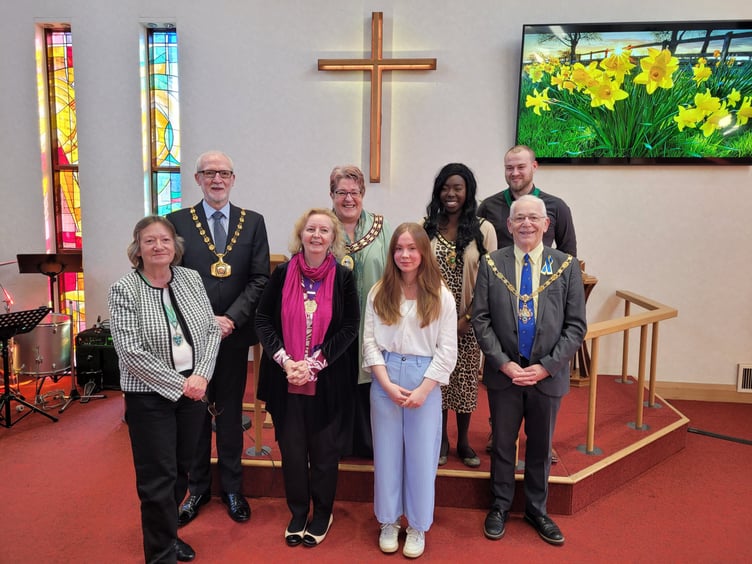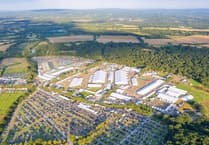Lillie Ewins from Young ACAN was invited by Alton mayor Pam Jones to speak at the civic service at Alton Methodist Church. Cllr Jones had planned the whole service – which was attended by mayors from around the area – to be environmentally themed. Here is Lillie’s passionate speech about the challenges facing us...
I’d like to start by thanking Councillor Pam Jones for inviting me to speak. I am aware the town council are trying to implement a climate emergency action plan – a plan I believe could make a world of difference.
“Today, one billion of the world’s most vulnerable children are at risk. Tomorrow, if the world fails to act, it will be all children.”
That’s a quote from Catherine Russell, UNICEF’s executive director, on the impact of the climate crisis on children – and it’s a fact that cannot be ignored.
Almost all children are set to experience a 1.5 degree rise in temperatures. Because temperatures will rise by 1.5 degrees. Mitigation efforts of countries to date don’t meet the 1.5 degree limit set as a target within the Paris agreement, which is a legally-binding international treaty on climate change, and instead set the world on track for a three-degree rise in temperatures.
That’s double the price we can afford.
On such a pathway, 92 per cent of all 16-year-old children today are expected to live within a world warmer by two degrees, and four per cent might even experience a three-degree rise in temperatures.
I’m 16 – 17 in June – and excited about life. The Covid-19 pandemic has taken away two years of my – and my peers’ – lives. We were 14, blinked, and now we’re looking at universities and life after compulsory education.
Life is complicated enough as it is without having to worry about if I will even have a future after another decade passes. Because the world is on path to exceed 1.5 degree warming within the next decade.
Do you know what the effects of that will be on life?
Let me explain to you what my peers and I are going to have to live through.
Mountain glaciers and rivers will start to disappear as the heat becomes oppressive and rids the world of its water sources. Within 85 years, one-third of the planet will be without fresh water. With a loss of water, even before this 85-year mark, comes a loss of food sources, and by 2050, a further 24 million children are predicted to be malnourished.
Plant growth will begin to slow, then stop entirely. Plants don’t absorb carbon dioxide very well, so they’ll begin to emit it instead.
If temperatures rise by two or three degrees, up to 40 per cent of the Amazon rainforest will be destroyed, and the warmer soil will kill vegetation, releasing even more carbon.
Warmer seas absorb less CO2, so it ends up in the atmosphere, again making our problem worse.
Cities will face destruction from stronger hurricanes or floods as sea levels continue to rise.
Humidity usually increases with heat, so areas of the globe will become uninhabitable, as we will no longer be able to produce sweat as a cooling mechanism, making the higher temperatures impossible to live with.
Increases in temperature and changing rain patterns are associated with the spread of vector-borne diseases, such as Lyme disease and malaria, which may begin to migrate to other regions of the globe. Pandemics will become the new normal.
The problem of global warming is self-sustaining, not just because its effects lead to increased levels of carbon dioxide in the atmosphere, worsening effects, but because the methods we use to survive as a race are the ones that will end up killing us.
We refuse to give up our fossil fuels and our creature comforts, ultimately choosing extinction rather than sacrifice the convenience of plastic packaging or petrol-run cars.
We choose to run from a
problem that could be the end of humanity, because it doesn’t have an easy solution and because we can’t be bothered to implement the hard ones.
While I complain about exams, or worry about picking the right university for me, I want to be able to have these stresses in my life.
I want to see the world as it is right now, to travel to Venice and sail down the canals without a deadline, without worrying that the city will become submerged before I get the chance to see it.
I want to see the pyramids without worrying that I’ll die of heat exhaustion, because my body is unable to cool itself down in immeasurably-high temperatures.
I want to laugh with my friends on a beach in the summer without unprecedented storms and flooding wiping away what is left of Britain’s coastline.
But most of all, I want to live, as you had the chance to do, as you have done. Because it’s our future too.
And that is why we’ve set up Young ACAN – the Young Alton Climate Action Network. It’s a chance for our voices to be heard in a world that doesn’t look to the future, or the future generation, to decide what happens next.
We’ve received a grant from the Community Lottery fund, and are set for our first event on April 2, Back on the Rack – a thrift shop event to reduce the effects of fast fashion.
Local action is so important – and young people need to be involved too.
Decisive action reduces climate anxiety, and gives us some control over a future that should be ours, and yet somehow is controlled by people we’ve never met, people who are decades older than us.
I’ll be honest with you. I don’t have all the solutions to the climate crisis, and it may be that some of these solutions haven’t even been developed yet.
But change begins with action, and enough is enough. Local action groups, like Young ACAN, make a world of change within our daily lives, and empower the minds of the future to take action on the climate crisis.
As the latest IPCC report concludes, any further delays in action will result in our missing “a brief and rapidly-closing window of opportunity to secure a liveable and sustainable future for all.”
All I am asking is that you say enough is enough, and do whatever it takes to campaign for change.
Thank you.





Comments
This article has no comments yet. Be the first to leave a comment.